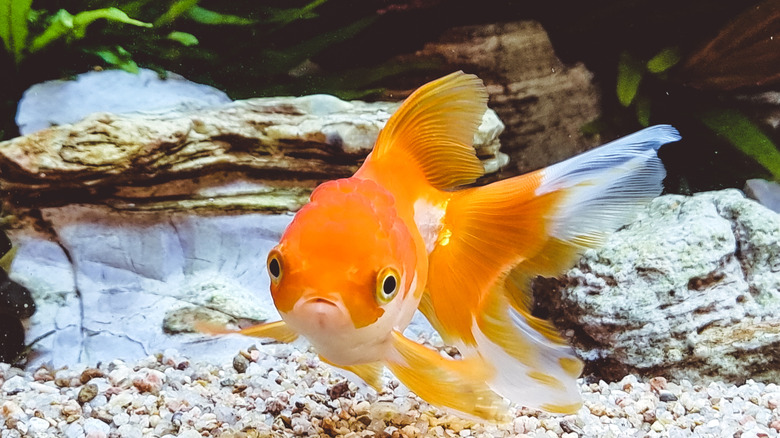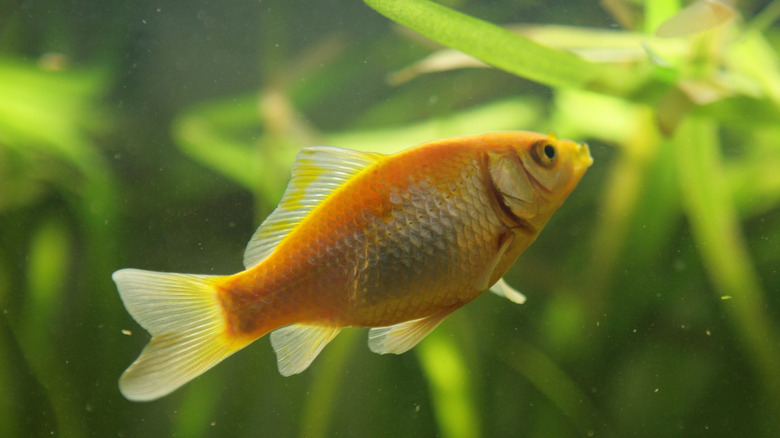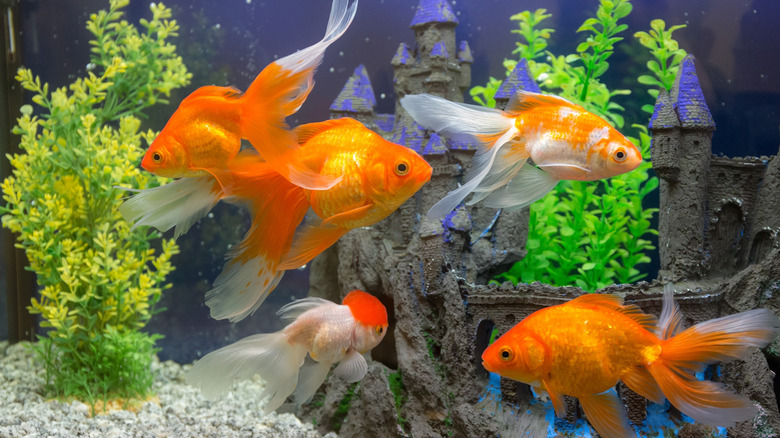Signs A Goldfish Is Happy
As pet owners, we want to do everything in our power to make sure the animals under our care are living happy lives. Your dogs, cats, guinea pigs, parakeets, lizards, snakes, and goldfish are all members of the family! And while it can be fairly easy to tell if your four-legged friend is happy since they can smile, wag their tail, and lick your face, you could stare at your goldfish for an hour and not get any indication of their mood.
Fish may not have human-like expressions like your goldendoodle, but a 2018 study in Animal Sentience found that fish do feel pain. The study concluded that when it comes to fish, "their welfare should be taken into consideration." While your pet fish Goldilocks may not be able to tell you that she's happy and comfortable, there are some signs to look out for that communicate that your little fishy is quite content.
According to Ohio Fish Rescue, when fish are active and moving around the tank with energy, that's a great sign. They might look "confident" and have their top fin up. A happy fish will also eat excitedly when you feed them. An injured fish is not a happy fish, so make sure your scaly friend doesn't have any blemishes or ripped fins. If they bump or rub against the side of the tank, that could be a sign of illness. Healthy and happy fish are also usually brighter in color, though if your goldfish gradually turns white and the color change is evenly distributed, that's most likely nothing to worry about.
How to create an ideal environment for your goldfish
Traditionally, you see goldfish swimming around water in plastic bags as carnival prizes or alone in tiny fish bowls, but goldfish actually require much more than that to live happy, healthy lives. First, you have to make sure that their tank and filter are big enough for their eventual size. According to the RSPCA, your goldfish's tank should be at least four times the length, two times the width, and three times the height of your goldfish's adult body length. And if you have more than one fish, the tank should be even larger.
Other elements of a healthy goldfish environment are good quality water at an ideal temperature (68-75 degrees Fahrenheit) with an effective filtration and aeration system and regular water changes. While a goldfish can technically live in a bowl without a filter, it's not the ideal environment. Since goldfish are prey animals, you'll also want to provide them with aquarium plants, rocks, and other structures where they can get some cover.
What you feed your goldfish will also have an effect on their wellbeing. Goldfish should only be fed once a day with an assortment of nutritious food throughout their lives. Flakes and pellets are good options, and those can be supplemented with brine shrimp, daphnia, krill, and some vegetables.
Should goldfish live alone?
When it comes to whether your goldfish should have a friend, the answer is that it depends. Goldfish can live by themselves, but they may get along okay with a tankmate. Generally, they are social, but it's really determined by your individual fish's personality and preferences. Some goldfish may prefer to live alone and if they're in a tank with another fish, the two of them could bite each other. Ideally, you want to keep goldfish with other goldfish, though there are some other types of fish they could coexist with.
While goldfish are extremely common first pets for kids, they require a little more TLC than just plopping them in a fish bowl and dropping in some fish flakes every so often. Make sure to take good care of your goldfish, and you'll have a happy, healthy, confident little buddy to share your home with!


